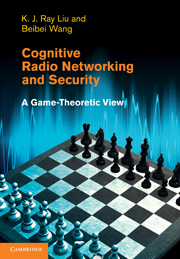Book contents
- Frontmatter
- Contents
- Preface
- Part I Cognitive radio communications and cooperation
- 1 Introduction to cognitive radios
- 2 Game theory for cognitive radio networks
- 3 Markov models for dynamic spectrum allocation
- 4 Repeated open spectrum sharing games
- 5 Pricing games for dynamic spectrum allocation
- 6 A multi-winner cognitive spectrum auction game
- 7 Evolutionary cooperative spectrum sensing games
- 8 Anti-jamming stochastic games
- 9 Opportunistic multiple access for cognitive networks
- Part II Resource awareness and learning
- Part III Securing mechanism and strategies
- References
- Index
2 - Game theory for cognitive radio networks
from Part I - Cognitive radio communications and cooperation
Published online by Cambridge University Press: 06 December 2010
- Frontmatter
- Contents
- Preface
- Part I Cognitive radio communications and cooperation
- 1 Introduction to cognitive radios
- 2 Game theory for cognitive radio networks
- 3 Markov models for dynamic spectrum allocation
- 4 Repeated open spectrum sharing games
- 5 Pricing games for dynamic spectrum allocation
- 6 A multi-winner cognitive spectrum auction game
- 7 Evolutionary cooperative spectrum sensing games
- 8 Anti-jamming stochastic games
- 9 Opportunistic multiple access for cognitive networks
- Part II Resource awareness and learning
- Part III Securing mechanism and strategies
- References
- Index
Summary
Cognitive radio technology, a revolutionary communication paradigm that can utilize the existing wireless spectrum resources more efficiently, has been receiving growing attention in recent years. Now that network users need to adapt their operating parameters to the dynamic environment, and may pursue different goals, traditional spectrum-sharing approaches based on a fully cooperative, static, and centralized network environment are no longer applicable. Instead, game theory has been recognized as an important tool in studying, modeling, and analyzing the cognitive interaction process. In this chapter, we introduce the most fundamental concepts of game theory, and explain in detail how these concepts can be leveraged in designing spectrum-sharing protocols, with an emphasis on state-of-the-art research contributions in cognitive radio networking. This chapter provides a comprehensive treatment of game theory with important applications in cognitive radio networks, and will aid the design of efficient, self-enforcing, and distributed spectrum-sharing schemes in future wireless networks.
Introduction
Cognitive radio technology has emerged in recent years as a revolutionary communication paradigm, which can provide faster and more reliable wireless services by utilizing the existing spectrum band more efficiently. A notable difference of a cognitive radio network from traditional wireless networks is that users need to be aware of the dynamic environment and adaptively adjust their operating parameters on the basis of interactions with the environment and other users in the network. Traditional spectrum-sharing and management approaches, however, generally assume that all network users cooperate unconditionally in a static environment, and thus they are not applicable to a cognitive radio network.
- Type
- Chapter
- Information
- Cognitive Radio Networking and SecurityA Game-Theoretic View, pp. 46 - 86Publisher: Cambridge University PressPrint publication year: 2010
- 1
- Cited by



